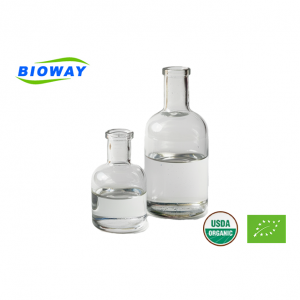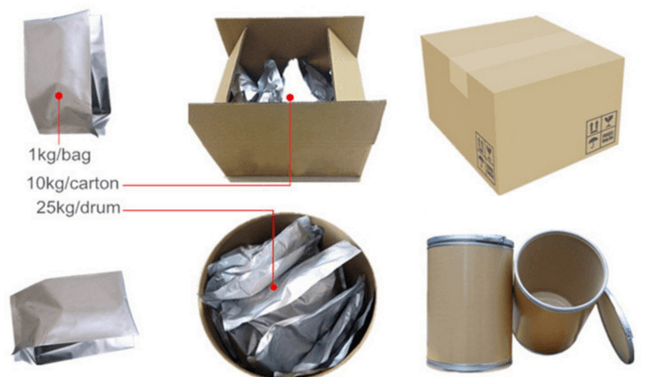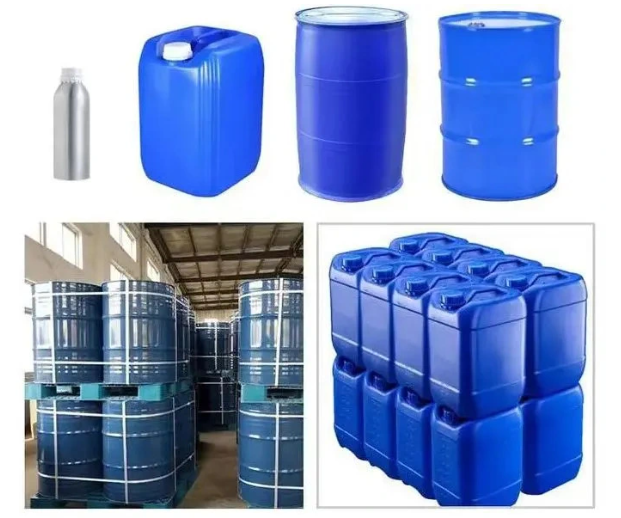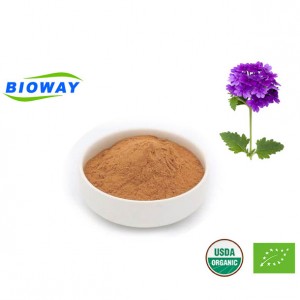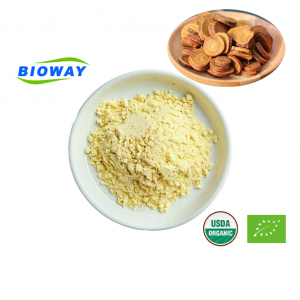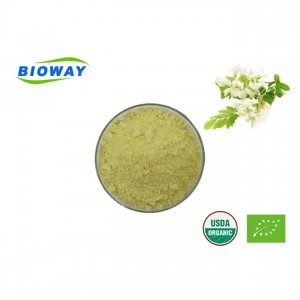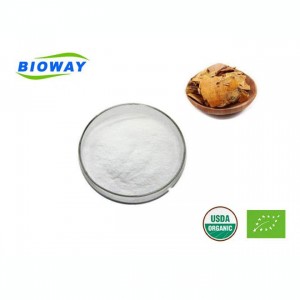Natural Benzyl Alcohol Liquid
Natural benzyl alcohol is a compound found in various plants and fruits, including orange blossom, ylang-ylang, jasmine, gardenia, acacia, lilac, and hyacinth. It is a colorless liquid with a pleasant, sweet aroma, and is commonly used in the fragrance and flavor industries. Natural benzyl alcohol can also be found in essential oils and is used as a preservative in some cosmetic and personal care products. It is generally considered safe for use in these applications when used in appropriate concentrations. Contact us for more information:grace@biowaycn.com.
Benzyl alcohol Chemical Properties
Melting point:-15°C
Boiling point:205°C
Density:1.045g/mLat25°C(lit.)
Vapor density: 3.7 (vsair)
Vapor pressure: 13.3mmHg (100°C)
Refractive index:n20/D1.539(lit.)
FEMA:2137|BENZYLALCOHOL
Flash point: 201°F
Storage conditions: Storeat+2°Cto+25°C.
Solubility:H2O:33mg/mL, clear, colorless
Form:Liquid
Acidity coefficient (pKa):14.36±0.10(Predicted)
Color:APHA:≤20
Relative polarity: 0.608
Odor:Mild, pleasant.
Fragrance type:floral
Explosive limit: 1.3-13% (V)
Hydrolysis capacity: 4.29g/100mL (20ºC)
Merck:14,1124
CAS database:100-51-6
1. Colorless liquid;
2. Sweet, pleasant aroma;
3. Found in various plants and fruits;
4. Used in fragrance and flavor industries;
5. Present in essential oils;
6. Used as a preservative in cosmetic and personal care products.
Used as a solvent in various applications;
Acts as a fragrance ingredient in perfumes and cosmetics;
Functions as a flavoring agent in food products;
Works as a preservative in personal care products;
Can be used as an intermediate in the synthesis of other chemicals;
Natural benzyl alcohol has various applications, including:
1. Fragrance and flavor industry: It is used as a fragrance ingredient in perfumes, cosmetics, and soaps. It is also a key component in the formulation of scents such as jasmine, hyacinth, and ylang-ylang.
2. Cosmetic and personal care products: It functions as a preservative in various cosmetic and personal care products, such as lotions, creams, and shampoos.
3. Industrial chemical production: It is used as a solvent in the production of coatings, paints, and inks. It also finds applications in the production of pharmaceuticals, synthetic resins, and vitamin B injections.
4. Other applications: Natural benzyl alcohol is used as a drying agent in the production of nylon, fibers, and plastic films. It is also utilized in the manufacturing of dyes, cellulose esters, and as an intermediate for benzyl esters or ethers. Additionally, it is used in the production of ballpoint pens and as a temporary permitted food flavoring.
Sourcing: Natural benzyl alcohol is sourced from plants and flowers that contain this compound, such as jasmine, ylang-ylang, and other aromatic plants.
Extraction: The extraction process can be carried out using methods such as steam distillation or solvent extraction. In steam distillation, the plant material is exposed to steam, which causes the essential oils containing benzyl alcohol to be released. The resulting mixture of essential oil and water is then separated, and the essential oil is collected.
Purification: The collected essential oil undergoes further purification processes to isolate the benzyl alcohol. This may involve techniques such as fractional distillation or solvent separation to obtain a more concentrated form of benzyl alcohol.
Drying (if necessary): In some cases, the benzyl alcohol may be dried to remove any remaining moisture, resulting in a powdered form of natural benzyl alcohol.
It’s important to note that the production of natural benzyl alcohol should be carried out with proper knowledge, expertise, and adherence to safety guidelines, especially when working with essential oils and natural extracts.
Packaging And Service
Packaging
* Delivery Time: Around 3-5 workdays after your payment.
* Package: In fiber drums with two plastic bags inside.
* Net Weight: 25kgs/drum,Gross Weight: 28kgs/Drum
* Drum Size & Volume: I.D.42cm × H52cm, 0.08 m³/ Drum
* Storage: Stored in a dry and cool place, keep away from strong light and heat.
* Shelf Life: Two years when properly stored.
Shipping
* DHL Express, FEDEX, and EMS for quantities less than 50KG, usually called as DDU service.
* Sea shipping for quantities over 500 kg; and air shipping is available for 50 kg above.
* For high-value products, please select air shipping and DHL express for safety.
* Please confirm if you can make the clearance when goods reach your customs before placing an order. For buyers from Mexico, Turkey, Italy, Romania, Russia, and other remote areas.
Payment And Delivery Methods
Express
Under 100kg, 3-5Days
Door to door service easy to pick up the goods
By Sea
Over300kg, Around 30 Days
Port to port service professional clearance broker needed
By Air
100kg-1000kg, 5-7Days
Airport to airport service professional clearance broker needed
Production Details (Flow Chart)
1. Sourcing and Harvesting
2. Extraction
3. Concentration and Purification
4. Drying
5. Standardization
6. Quality Control
7. Packaging 8. Distribution
Certification
It is certified by ISO, HALAL, and KOSHER certificates.
FAQ (Frequently Asked Questions)
Q: Is benzyl alcohol safe for skin?
A: Benzyl alcohol is generally considered safe for use in skincare products when used in appropriate concentrations. It is commonly used as a preservative in cosmetics and personal care products, as well as in formulations for its fragrance properties. When used at low concentrations, benzyl alcohol is unlikely to cause skin irritation or sensitization for most people.
However, some individuals with sensitive skin may experience a mild allergic reaction to benzyl alcohol. In rare cases, higher concentrations of benzyl alcohol can cause skin irritation or allergic reactions in some individuals. It’s important to note that the safety of any specific product containing benzyl alcohol depends on the overall formulation and the concentration used.
As with any skincare ingredient, it’s advisable to perform a patch test before using a product containing benzyl alcohol, especially if you have sensitive skin or a history of allergic reactions. If you have concerns about using products containing benzyl alcohol, consulting a dermatologist or healthcare professional is recommended.
Q: What are the disadvantages of benzyl alcohol?
A: While benzyl alcohol is widely used in various industries and is generally considered safe when used appropriately, there are some potential disadvantages and considerations associated with its use:
Skin Sensitivity: Some individuals with sensitive skin may experience mild allergic reactions or skin irritation when exposed to benzyl alcohol, especially at higher concentrations.
Inhalation Risk: In its liquid form, benzyl alcohol can produce vapors that, if inhaled in high concentrations, may cause respiratory irritation. Proper ventilation and handling procedures should be followed when working with liquid benzyl alcohol.
Toxicity: Ingestion of large amounts of benzyl alcohol can be toxic, and it should not be consumed orally. Care should be taken to keep benzyl alcohol-containing products out of reach of children and pets.
Environmental Impact: Like many chemical compounds, improper disposal of benzyl alcohol can have negative environmental effects. It is important to follow proper disposal guidelines and regulations.
Regulatory Restrictions: In some regions, there may be specific regulations or restrictions on the use of benzyl alcohol in certain products or applications.
As with any chemical substance, it’s important to use benzyl alcohol in accordance with recommended guidelines and safety precautions. If you have specific concerns about the use of benzyl alcohol, consulting with a healthcare professional or relevant regulatory authorities is advisable.






